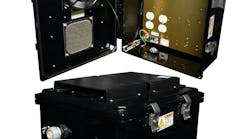By John McHale
RALEIGH, N.C., — Engineers at Thales Computers in Raleigh, N.C., are providing commercial-off-the-shelf (COTS) signal processing single-board computers for two sonar applications for the French and Australian navies.
Thales Computers, formerly Cetia, is a subsidiary of the Thales Group, which itself is formerly Thomson CSF in Toulon, France.
Thales experts are delivering their commercial off-the-shelf (COTS) VxG4a boards to Thomson Marconi Sonar Ltd. in Sophia-Antipolis, France, to improve the sonar capabilities of French and Australian mine-hunting ships.
"In 1998, we decided to widen our COTS policy to include signal processing computers in our sonar devices," says Ian Jones, technical director for Thomson Marconi Sonar InBoard Technology Center. "After an extensive international selection process, we selected the [Thales] solutions for these two programs, based on the performance of their hardware, the quality of their software development tools, competitive pricing — including upgrade policies and long-term support — and [Thales's] knowledge of and respect for standards and COTS policy.
Thomson Marconi engineers selected computers based on Thales's PowerPC 7400 (G4) or AltiVec, processor. Engineers can combine and interconnect Thales's dual or quad processor PowerPC boards via high-speed networks to match algorithms and data flow of each application.
Thales's Powerline4 supervision toolkit can help designers build data- or signal-processing systems based on COTS hardware and software, Thales officials say. COTS development tools and operating systems are also available to support Cetia hardware.
The introduction of Motorola's AltiVec chip has opened the signal processing market for Thales, says Philippe Vincent, vice president of sales and marketing for Thales Computers. It is a general-purpose processor that can perform Fast Fourier Transforms (FFTs) with better performance than the typical digital signal-processing (DSP) chip, he adds.
Designers would need several different DSP chips to equal one G4 processor, Vincent says, point out that the more chips designers use, the more their costs go up. By switching to AltiVec-based computers designers will not only reap performance advantages, but reduce costs as well, Vincent says.
The Thales VxG4a board offers two or four AltiVec's on the same board and "with 2 megs of cache they can run FFTs without accessing the main memory," Vincent explains. It also uses two PCI buses to move data quickly.
PowerPC works with all the standard operating systems in the industry, Vincent says. The Thomson Marconi application is using the LynxOS real-time operating system from LynuxWorks in San Jose, Calif.
The new company name, Thales Computers, follows a wide-ranging strategic review for Thales Group and its subsidiaries, Thales officials say.
The name change is based on Thales of Miletus, a mathematician and philosopher born in Greece around 625 BC. Thales was known for helping move popular thought from myth to science and philosophy, and as the initiator of Greek philosophy.


